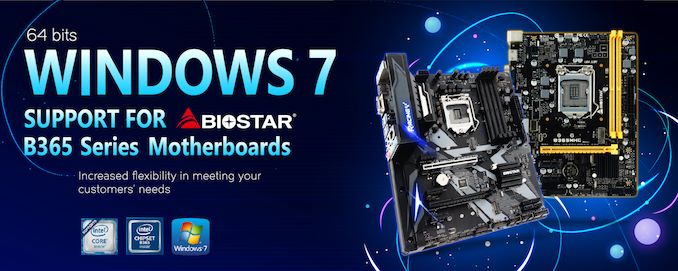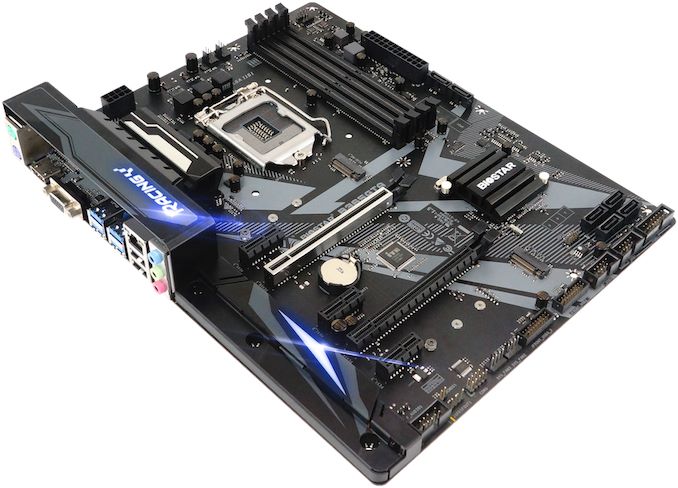BIOSTAR Brings Windows 7 To Intel's B365 Platform: A Core i9-9900K w/ Win7, Anyone?
by Anton Shilov on February 20, 2020 1:30 PM EST- Posted in
- Motherboards
- Intel
- Biostar
- Windows 7
- B365

Even though Microsoft ended regular support for Windows 7 last month, there are millions of customers who continue to use the OS and plan to stick with it for a while to come. But even without essential security updates, trying to use Windows 7 in 2020 comes with an even bigger roadblock: most modern platforms aren't supported by the OS, which limits upgrades and replacement hardware to badly outdated parts. So, in an effort to continue supporting customers who want to use Windows 7 no matter what, BIOSTAR has found a way to install Windows 7 on its B365 chipset-based motherboards, which opens doors to new Windows 7-powered desktops with Intel's latest-generation CPUs.
Released in 2009, Microsoft Windows 7 does not support a host of technologies supported by the latest platforms, which is why Microsoft cut off new hardware support for Windows 7 starting with AMD’s Ryzen and Intel’s Kaby Lake (7th gen Core) platforms. Reciprocally, neither AMD nor Intel officially support Microsoft’s legacy operating systems with drivers for their latest platforms. As a result, while it's not impossible to install Windows 7 on newer hardware, it's certainly something that is discouraged at multiple levels.
But since it's not impossible, BIOSTAR has gone ahead and put together a special tool to simplify the process for users. The tool automatically adds Intel B365-specific features to a Windows 7 SP1 installation image, allowing the OS to be installed on the platform.
Overall, BIOSTAR's method overcomes the three key blocks that prevent Windows 7 from being installed on a new platform: the lack of UEFI loader, an xHCI driver for USB 3.0, and an NVMe driver. These problems can already by surmounted if you know what you're doing, but this is the first time we've seen a manufacturer so directly attempt to support Windows 7 on newer hardware via an easy-to-use method, and thus far BIOSTAR is the only company doing this. Not that it isn't without some peculiarities (described here), but support is support all the same.
BIOSTAR has two Intel B365-based motherboards that can use Windows 7: the ATX form-factor Racing B365GTA aimed at gamers, as well as the Micro-ATX B365MHC targeted at mainstream users. The former supports virtually all Intel LGA1151 processors, including the cream of the crop eight-core Core i9-9900K, whereas the latter can work with chips up to Intel’s eight-core Core i7-9700K.
Overall, BIOSTAR's decision to base their support around the B365 chipset is a curious one on the surface, but something that makes more sense as you dig into the chipset. While Intel’s B365 PCH is a part of the 300-series chipset family, the chipset is essentially a holdover from Intel's earlier 200 series chipsets, and has much more in common with them. So supporting Windows 7 on B365 is much less of a stretch than on Cannon Point chipsets like B360, as BIOSTAR doesn't have to worry about things like Intel's updated USB 3.1 Gen 2 controller or CNVi wireless support.
Related Reading:
- Intel Adds B365 Chipset to Lineup: The Return of 22nm
- BIOSTAR Adds Windows 7 Support To Some Intel and AMD Motherboards
- CES 2019: ASRock's Five New B365 Motherboards
- Microsoft Brings DirectX 12 To Windows 7
- Intel Preps New H310 Chipset Revision With Windows 7 Support For Coffee Lake
- How To Get Ryzen Working on Windows 7 x64
Source: BIOSTAR (via TechPowerUp)











49 Comments
View All Comments
PeachNCream - Thursday, February 20, 2020 - link
I don't see any reason why the use of an unsupported operating system by this...um...charming individual would have any impact on the rest of us. While Linux distributions are my primary operating system at home and in the workplace even I will admit that it isn't suitable for everyone.Reflex - Thursday, February 20, 2020 - link
Because botnets need homes. Unsupported/un-updated operating systems tend to be those homes.willis936 - Friday, February 21, 2020 - link
Keeping ransomware profitable affects us all.DominionSeraph - Friday, February 21, 2020 - link
Imagine getting your entire identity from using a hobbyist OS.quiksilvr - Thursday, February 20, 2020 - link
Okay but why though? Windows 7 no longer gets security updates. Unless you are running this set up purely offline (unlikely) what is the benefit of sticking with Windows 7?baka_toroi - Thursday, February 20, 2020 - link
It gets security updates until 2023Buur - Thursday, February 20, 2020 - link
It very much does not. Unless you are a business paying for patches.Kstailey - Thursday, February 20, 2020 - link
There are plenty of security options better that MS Windows. Lack of support doesn't scare me and I build custom gaming rigs. Thanks to Biostar, and a Win 7 option. Im in. Windows 10 sucks. Plus, Win 7 is still getting updates. Just got one two days ago.Whiteknight2020 - Thursday, February 20, 2020 - link
Win 10 very much does not suck. Same kernel as server 2016/19, very solid. What sucks is when people stuff it full of legacy cruft or think they know how to "tweak" it better than the guys n gals who wrote the actual code.HowDoesAnyOfThisWork - Thursday, February 20, 2020 - link
You mean those guys n gales that wrote the actual code and which deserve a big thank you for providing us with plenty of entertainment about W10 updates hilariously going bonkers. It puts a smile on my face, remembering past W10 update stories while looking forward to the next inevitable W10 update malaise and the wonderfully snarky news coverage that will come with it, inevitably...